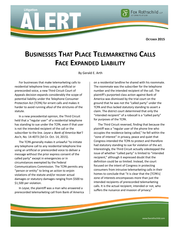Description
3
Upholding the extraterritorial reach of the right to
be forgotten as sought by the CNIL abridges and
curtails the ability of U.S. multinational companies
to conduct business in ways that they see ï¬t,
and in ways that are completely lawful.
CNIL rejected the compromise, insisting that full
compliance with French law means delisting qualifying
information from Google domains globally, regardless
of the physical location of the person searching for the
information. As a practical matter, France wants
Google to suppress information that qualifies under the
right to be forgotten from any person’s Google search
done anywhere in the world.
In July 2015, Google appealed the a100,000
($112,066) fine, defending its right to freely conduct
business and freedom of expression beyond French
borders. For Google, the amount of the fine is hardly
the issue.
Rather, Google maintains that complying with French law should not impede the access of information outside of France. Implications of CNIL’s Approach to the Right to Be Forgotten Upholding the extraterritorial reach of the right to be forgotten as sought by CNIL not only abridges and cur- PRIVACY & SECURITY LAW REPORT ISSN 1538-3423 tails the ability of U.S. multinational companies to conduct business in ways that they see fit, but also in ways that are completely lawful. Removing or suppressing information available from search engines on a worldwide basis limits the universe of available information for businesses and consumers alike, and directly infringes on an equally basic right to freedom of expression.
As a practical matter, extending the reach of the right to be forgotten constrains how search engine providers do business, particularly because their principal purpose is to collect, organize and disseminate information for public access. If upheld, French law would control the search engine results of a person accessing Google in the U.S. The foregoing sets a dangerous precedent, raising questions of state sovereignty and conflicts of laws, and triggering a slippery slope of extraterritorial rule over the availability of information over the Internet. U.S. businesses and consumers accessing information that is lawfully disseminated over the internet would be hampered by search results that are limited by CNIL’s take on the right to be forgotten.
Cutting off sections of the internet as dictated by a nation-state tends to legitimize the efforts of countries like China, Iran and Turkey that have long controlled, or attempted to control, the information their citizens access online. Although each country may have a right to protect the personal privacy of its citizens in ways that it sees fit, this right should not impede the rights of other countries to do the same. If upheld, the approach to personal privacy proscribed by CNIL threatens to trample the equal and competing legitimate rights of businesses and consumers outside the EU. BNA 6-20-16 .
Rather, Google maintains that complying with French law should not impede the access of information outside of France. Implications of CNIL’s Approach to the Right to Be Forgotten Upholding the extraterritorial reach of the right to be forgotten as sought by CNIL not only abridges and cur- PRIVACY & SECURITY LAW REPORT ISSN 1538-3423 tails the ability of U.S. multinational companies to conduct business in ways that they see fit, but also in ways that are completely lawful. Removing or suppressing information available from search engines on a worldwide basis limits the universe of available information for businesses and consumers alike, and directly infringes on an equally basic right to freedom of expression.
As a practical matter, extending the reach of the right to be forgotten constrains how search engine providers do business, particularly because their principal purpose is to collect, organize and disseminate information for public access. If upheld, French law would control the search engine results of a person accessing Google in the U.S. The foregoing sets a dangerous precedent, raising questions of state sovereignty and conflicts of laws, and triggering a slippery slope of extraterritorial rule over the availability of information over the Internet. U.S. businesses and consumers accessing information that is lawfully disseminated over the internet would be hampered by search results that are limited by CNIL’s take on the right to be forgotten.
Cutting off sections of the internet as dictated by a nation-state tends to legitimize the efforts of countries like China, Iran and Turkey that have long controlled, or attempted to control, the information their citizens access online. Although each country may have a right to protect the personal privacy of its citizens in ways that it sees fit, this right should not impede the rights of other countries to do the same. If upheld, the approach to personal privacy proscribed by CNIL threatens to trample the equal and competing legitimate rights of businesses and consumers outside the EU. BNA 6-20-16 .
Regulations Presentations
+
Regulations Sub Categories














